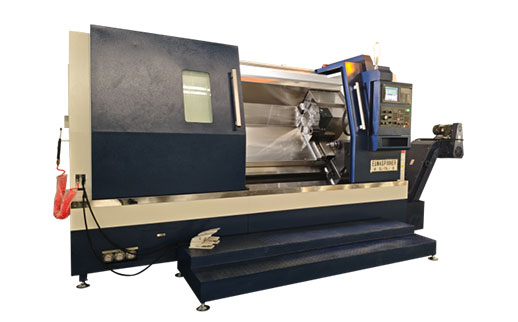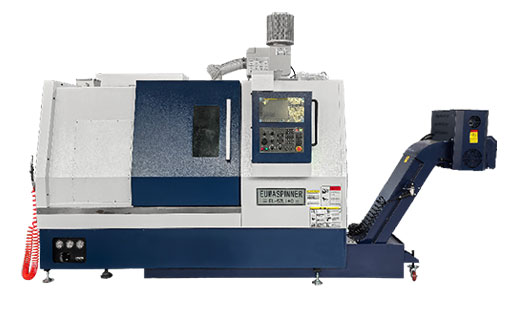From aerospace components to microscale electronics, milling machines(CNC Turn Mill Lathes) are foundational to precision manufacturing. Using rotating cutting tools to shape workpieces, they excel at complex geometries and tight tolerances—capabilities amplified by Computer Numerical Control (CNC) tech, making them indispensable for industries chasing efficiency and customization. Below is a focused look at sectors gaining the most strategic value.
The aerospace and defense sector operates under stringent standards, requiring components to withstand extreme thermal, pressure, and mechanical stress—demands that exceed the capabilities of conventional manufacturing technologies. Milling machines address these needs through:
Turbine and engine component fabrication: 5-axis CNC milling machines shape heat-resistant superalloys (e.g., titanium alloys, nickel-based Inconel) into intricate turbine blades and engine compressors. These components require dimensional accuracy within ±0.01mm, as even minimal deviations can compromise engine thrust and safety.
Airframe structure machining: Milling systems process lightweight materials (e.g., aluminum-lithium alloys, carbon-fiber reinforced polymers) into fuselage frames and wing ribs, ensuring tolerances as tight as ±0.005mm to enable seamless assembly and reduce aerodynamic drag.
The automotive industry relies on milling machines to deliver the consistency and scalability required for mass production of safety-critical components. Key applications include:
Powertrain component machining: Milling systems precision-carve engine blocks, cylinder heads, and transmission housings from cast iron or aluminum alloys, creating intricate internal channels for oil circulation, coolant flow, and fuel injection—features that directly impact engine efficiency and emissions.
Chassis and suspension component fabrication: Control arms, steering knuckles, and axle brackets (load-bearing parts) are milled to ensure uniform material density and dimensional consistency, minimizing vibration and enhancing vehicle handling.
In medical manufacturing, precision and biocompatibility are non-negotiable—requirements that CNC milling machines fulfill by enabling patient-specific and regulatory-compliant production. Core use cases include:
Orthopedic implant fabrication: Custom artificial joints (hip, knee, and spinal implants) are milled from biocompatible materials (e.g., titanium Grade 5, cobalt-chromium alloys) using 3D scan data. This process ensures implants align with a patient’s unique anatomy, reducing post-surgical complications.
Surgical instrument machining: High-precision milling creates ultra-sharp edges and smooth surfaces for scalpels, endoscopic tools, and orthopedic drills. These features prevent tissue trauma during procedures and support sterilization compliance (e.g., ISO 13485 standards).
A U.S.-based medical device manufacturer highlighted that its CNC milling workflow reduced the lead time for patient-specific spinal fusion screws from 14 days to 48 hours. This acceleration has enabled surgeons to treat acute spinal injuries more rapidly, improving patient outcomes.
As consumer electronics (e.g., smartphones, wearables, drones) trend toward miniaturization, milling machines have adapted to deliver micro-level precision. Key applications include:
Device enclosure machining: Micro-CNC milling systems carve aluminum or magnesium alloy middle frames for smartphones, creating micro-grooves (0.1mm width) to accommodate cameras, batteries, and circuit boards—all while maintaining tolerances of ±0.01mm to ensure component fit.
Thermal management component fabrication: Milling machines create micro-channels in copper or aluminum heat sinks, optimizing heat dissipation for high-performance chips (e.g., 5G modems, drone flight controllers) and preventing thermal throttling.
Virtually all high-volume manufactured products (e.g., plastic packaging, automotive parts, consumer goods) depend on molds and dies—tools that are primarily fabricated using milling machines. Key applications include:
Plastic injection mold machining: CNC milling systems carve intricate cavities into tool steel or aluminum blocks, creating mold geometries that define the shape of plastic parts (e.g., laptop casings, medical syringes). These molds require surface finishes of Ra 0.2μm to ensure defect-free plastic part ejection.
Metal stamping die fabrication: Milling machines shape stamping dies for metal components (e.g., soda cans, automotive body panels), ensuring uniform pressure distribution during stamping to avoid material warping.
A German mold-making firm specializing in consumer goods noted that upgrading to 5-Axis Machining Center (A/C axis) reduced the lead time for a plastic injection mold (for household appliance housings) from 6 weeks to 3 weeks. This accelerated turnaround enabled its client (a global appliance brand) to launch a new product line two months ahead of schedule, gaining market share.
5-Axis Machining Center (A/C axis)
Modern milling machines continue to evolve in tandem with industry needs, incorporating innovations such as:
High-speed spindles: Spindles with rotational speeds up to 60,000 RPM enable faster material removal rates for hard-to-machine alloys.
Smart process monitoring: Integrated sensors and AI-driven software optimize cutting paths, detect tool wear in real time, and reduce unplanned downtime via predictive maintenance.
Hybrid machining capabilities: Combining milling with additive manufacturing (e.g., 3D printing + milling) enables the production of complex parts with both structural integrity and precision finishes.
If you want to know more about CNC, you can contact EUMA Machinery, we can provide effective help
In an era defined by precision, scalability, and customization, milling machines remain irreplaceable. Whether powering the next generation of aircraft, enabling life-saving medical treatments, or supporting the production of smart devices, these systems continue to be the backbone of industrial progress—bridging design innovation and real-world application.



GET A QUOTE